英语人称与物称1
英语的人称代词、物主代词的用法
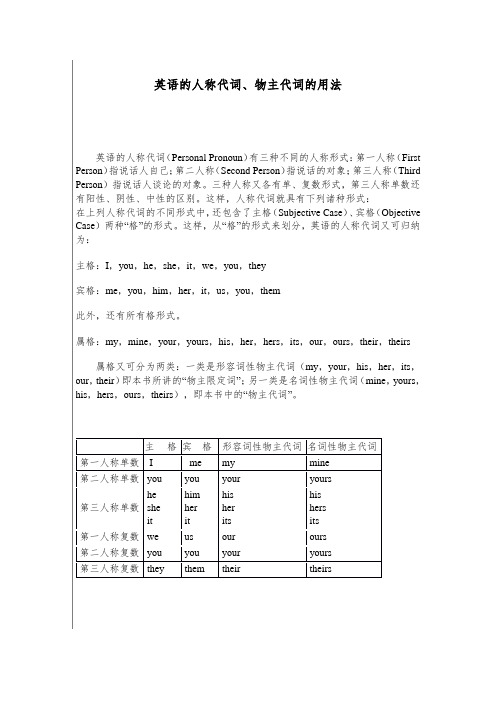
英语的人称代词、物主代词的用法英语的人称代词(Personal Pronoun)有三种不同的人称形式:第一人称(First Person)指说话人自己;第二人称(Second Person)指说话的对象;第三人称(Third Person)指说话人谈论的对象。
三种人称又各有单、复数形式,第三人称单数还有阳性、阴性、中性的区别。
这样,人称代词就具有下列诸种形式:在上列人称代词的不同形式中,还包含了主格(Subjective Case)、宾格(Objective Case)两种“格”的形式。
这样,从“格”的形式来划分,英语的人称代词又可归纳为:主格:I,you,he,she,it,we,you,they宾格:me,you,him,her,it,us,you,them此外,还有所有格形式。
属格:my,mine,your,yours,his,her,hers,its,our,ours,their,theirs 属格又可分为两类:一类是形容词性物主代词(my,your,his,her,its,our,their)即本书所讲的“物主限定词”;另一类是名词性物主代词(mine,yours,his,hers,ours,theirs),即本书中的“物主代词”。
人称代词用法:1)人称代词的主格在句子中作主语或主语补语,例如:John waited a while but eventually he went home.约翰等了一会儿,最后他回家了。
John hoped the passenger would be Mary and indeed it was she.约翰希望那位乘客是玛丽,还真是她。
说明:在复合句中,如果主句和从句主语相同,代词主语要用在从句中,名词主语用在主句中,例如:When he arrived, John went straight to the bank.约翰一到就直接去银行了。
2)人称代词的宾格在句子中作宾语或介词宾语,但在口语中也能作主语补语,第一人称在省略句中,还可以作主语,例如:I saw her with them, at least, I thought it was her.我看到她和他们在一起,至少我认为是她。
物称和人称

2 用作虚义词,代替的主语是难以言 表的现象或情形,用以表示自然现象 、时间、空间以及惯用语之中。 How is it with the sick man?
3 用作强调词,应到所需要的成分, 也是一种形式主语。 It is a good horse that never stumbles.
2. 转化非人称主语,把英语的简单句和复 杂句拆成汉语的并列句或流水句。
1) Her weariness and the increasing heat determined him to sit down in the first convening shade.他疲惫不堪,天气也越来越热,他决意一遇到个近 便的阴凉处,就坐下来休息。
信息中心位置,从而突显物称倾向。
汉语在无确定人称时,采用如有人,人们, 别人,大家等泛称或无主句,从而突显人称
倾向。
1)用作先行词代替真正的主语或宾语。 It never occurred to me that she was so dishonest. 我从来没想过她会这么不老实。
2)用作虚意词,代替的主语是难以言明的现象或者情形,如用以 表示自然现象、时间、空间以及惯用语中。 How is it with the sick man ? 那个病人怎么样了?
3. 把非人称代词主语句换成汉语的的无主句或主 语泛称句。
1) The mastery of a language requires painstaking efforts. 要掌握一门语言,必须下功夫。
2) A little flattery will fetch him. 稍一奉承就会把她迷惑住了。
4) A lack of information and formal educational training had left many persons without any generalized standards of judgment applicable to this novel situation.
英语人称代词和物主代词
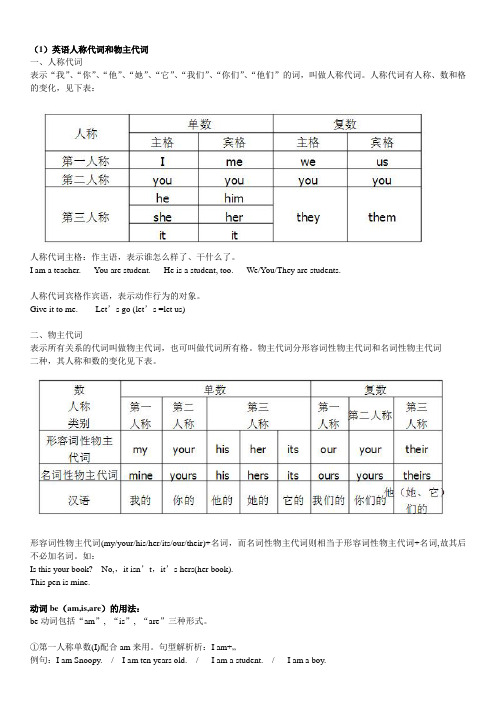
(1)英语人称代词和物主代词一、人称代词表示“我”、“你”、“他”、“她”、“它”、“我们”、“你们”、“他们”的词,叫做人称代词。
人称代词有人称、数和格的变化,见下表:人称代词主格:作主语,表示谁怎么样了、干什么了。
I am a teacher. You are student. He is a student, too. We/You/They are students.人称代词宾格作宾语,表示动作行为的对象。
Give it to me. Let’s go (let’s =let us)二、物主代词表示所有关系的代词叫做物主代词,也可叫做代词所有格。
物主代词分形容词性物主代词和名词性物主代词二种,其人称和数的变化见下表。
形容词性物主代词(my/your/his/her/its/our/their)+名词,而名词性物主代词则相当于形容词性物主代词+名词,故其后不必加名词。
如:Is this your book? No,,it isn’t,it’s hers(her book).This pen is mine.动词be(am,is,are)的用法:be动词包括“am”, “is”, “are”三种形式。
①第一人称单数(I)配合am来用。
句型解析析:I am+…例句:I am Snoopy. / I am ten years old. / I am a student. / I am a boy.②第二人称(You)配合are使用。
句型解析:You are+…例句:You are my good friend. / You are a good teacher. / You are beautiful.③第三人称单数(He / She / It) 配合is使用。
句型解析:She (He, It) is +……例句:She is a good girl. She is so tall. She is short.④人称复数(we /you/they) 配合are使用。
(完整版)英语人称代词和物主代词
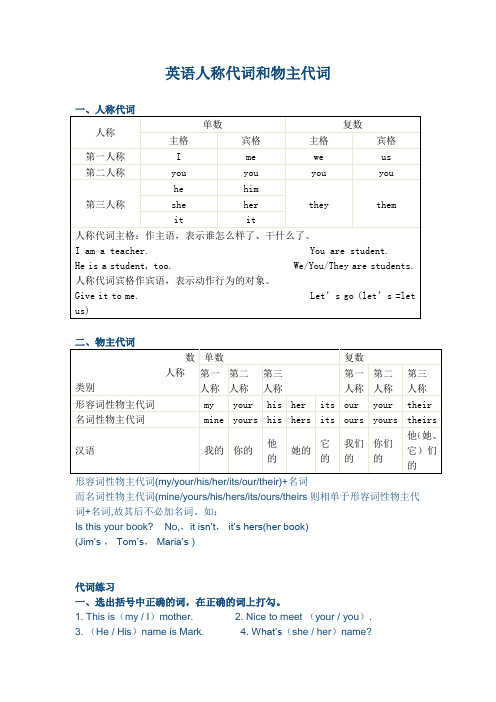
5. Excuse(me / my / I).6. Are(your / you)Miss Li?7.(I/ My)am Ben. 8.(She / Her)is my sister.9. Fine , thank (your / you). 10. How old is (he / his)二、用所给代词的正确形式填空。
1. These are ______ ( he ) brothers.2. That is _______( she ) sister.3. Lily is _______ ( Lucy ) sister.4. Tom, this is _____ ( me ) cousin, Mary.5. Now _____________(her parent) are in America.6. Those __________ ( child ) are _____ ( I ) father’s students.7. Do you know ______ ( it ) name?8. Mike and Tom __________ ( be ) friends.9. Thanks for helping ________( I ).10. ______(Ann安)mother is ______(we) teacher.三、单项选择。
()1. My family ____ a big family. My family ____all here.A. is, isB. are, areC. is, areD. are, is()2. This is __________.A. a picture of familyB. a picture of my familyC. a family’s pictureD. a family of my picture()3. Let’s __________ good friends.A. beB. areC. isD. am()4. Is she your aunt? Yes, __________.A. she’sB. her isC. she isD. he is ()5. Are __________ coats yours? Yes, they are .A. theyB. theseC. thisD. there ()6. Is that __________ uncle? No, it isn’tA. heB. sheC. herD. hers()7. Mrs. Green is __________ grandmother.A. Jim and KateB. Jim and Kate’sC. Jim’s and Kate’sD. Jim and Kates’()8. Do you know the name _____Mr. Green’s son?A. inB. ofC. onD. or ()9. __________ the great photo of your family.A. thank forB. Thanks forC. Thank forD. thanks for()10. Are those your friends? __________.A. Yes, they’reB. No, they areC. Yes, they areD. Yes, those are答案:一.my you His her me you I she you he二.1.his 2.her 3.Lucy’s 4.my 5.her parents 6. children my 7. its 8.are 9. me 10.Ann’s our三.CBACBCBBBC。
英语人称代词及其用法(1)
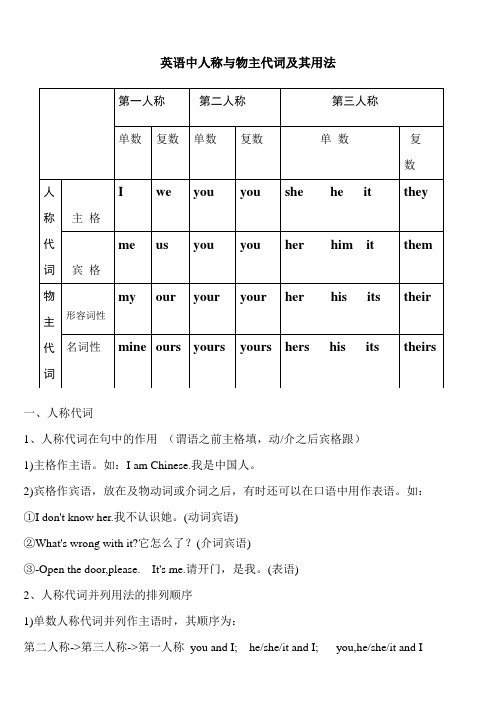
英语中人称与物主代词及其用法一、人称代词1、人称代词在句中的作用(谓语之前主格填,动/介之后宾格跟)1)主格作主语。
如:I am Chinese.我是中国人。
2)宾格作宾语,放在及物动词或介词之后,有时还可以在口语中用作表语。
如:①I don't know her.我不认识她。
(动词宾语)②What's wrong with it?它怎么了?(介词宾语)③-Open the door,please. It's me.请开门,是我。
(表语)2、人称代词并列用法的排列顺序1)单数人称代词并列作主语时,其顺序为:第二人称->第三人称->第一人称you and I; he/she/it and I; you,he/she/it and I2)复数人称代词作主语时,其顺序为:第一人称->第二人称->第三人称即:we and you; you and they; we,you and they二、物主代词1、物主代词分形容词性物主代词和名词性物主代词。
形容词性物主代词在句中相当于形容词只用作定语,后面必须跟名词;名词性物主代词则不能用作定语,单独使用,可以用作主语、宾语、表语、连用of作定语等。
(物主代词两类型,形容词与名词性。
形容词性作定语,后面定把名词用。
名词性要独立用,主宾表语它都充)。
例如:Is that your bike? 那是你的自行车吗?Here is my dog. Its name is Tom. 这是我的狗,它的名字叫汤姆。
Is that coffee yours or hers? 这咖啡是你的还是她的?2、如果名词前用了形容词性物主代词,就不能再用冠词(a, an, the)、指示代词(this, that, these, those)等修饰词了。
例如:这是他的书桌。
误:This is his a desk. 正:This is his desk.3、与形容词一起修饰名词时,形容词性物主代词要放在形容词的前面。
人称代词和物主代词的用法

人称代词和物主代词的用法一、人称代词的用法人称代词是指用来代替特定人或事物的代词,可分为第一人称、第二人称和第三人称。
在英语中,人称代词在句子中起到连接作用,使语言表达更加简洁明了。
以下将详细介绍各个人称代词的具体用法。
1. 第一人称代词第一人称代词包括“I”(我)和“We”(我们)。
这些代词通常用于表示说话者自己或与之有关的事物。
例句:- I am going to the store.(我要去商店。
)- We are having a party tomorrow.(我们明天要开派对。
)2. 第二人称代词第二人称代词主要包括“You”(你)和“You all”(你们)。
这些代词常被用于直接对话或发出指示。
例句:- You look great today!(你今天看起来很棒!)- Can you all please be quiet?(请你们都安静一下好吗?)3. 第三人称代词第三人称代词根据单数或复数形式,分别包括“He/She/It”(他/她/它)和“They”(他们/她们/它们)。
这些代词通常用来指示与说话者和听众无关的人或物。
例句:- He is my brother.(他是我的哥哥。
)- She is studying for her exams.(她正在为她的考试复习。
)- It is raining outside.(外面正在下雨。
)- They are going on vacation next week.(他们下周要去度假。
)二、物主代词的用法物主代词是用来表示某人或某物所属关系的代词。
它们用于指示特定的所有者,并且根据性别、数量和格形式变化。
接下来将详细介绍各种情况下物主代词的正确用法。
1. 单数形式单数形式的物主代词包括“My”(我的)、“Your”(你的)、“His”(他的/它的)和“Her”(她的)。
例句:- This is my book.(这是我的书。
)- Is this your pen?(这是你的钢笔吗?)- His car is parked over there.(他的车停在那边。
物称与人称

汉人的思维习惯---汉人的思维习惯-----“有灵动词” --“有灵动词”一般 只和人称搭配。 人称搭配 只和人称搭配。但存
隐喻+ 在,隐喻+拟人
北京目睹过许多伟大的历史事件 过许多伟大的历史事件。 3)北京目睹过许多伟大的历史事件。 Beijing has witnessed many great historical events. 过去的几十年见证着我们社会的飞速发展。 4)过去的几十年见证着我们社会的飞速发展。 The past decades saw rapid development in our society.
1)Excitement deprived me of all power ) of utterance. 兴奋得什么话也说不出来。 我兴奋得什么话也说不出来。 2)The thick rpet killed the sound of ) my footsteps. 我走在厚厚的地毯上,一点脚步声也没有。 我走在厚厚的地毯上,一点脚步声也没有。
1)Voices are heard calling for help. 有人听到了呼救的声音 听到了呼救的声音。 有人听到了呼救的声音。 2)Some things have been said here tonight that ought not to have been spoken. 今晚有人在此讲了些不该讲的话。 有人在此讲了些不该讲的话 今晚有人在此讲了些不该讲的话。 中文句中的“有人”是一个泛称。) (中文句中的“有人”是一个泛称。) 3)Wrongs must be righted when they are discovered. 发现了错误,一定要改正。 发现了错误,一定要改正。
英语用抽象名词或无生命的事物名 英语用抽象名词或无生命的事物名 抽象名词或无生命的事物 称作主语,同时又使用本来表示人的动 称作主语,同时又使用本来表示人的动 作或行为的动词作谓语 作谓语, 作或行为的动词作谓语,因而这种句式 往往带有拟人化的修辞色彩,语气含蓄, 往往带有拟人化的修辞色彩,语气含蓄, 令人回味,反映了英美国家的幽默感。 令人回味,反映了英美国家的幽默感。
物称与人称

物称与人称( Impersonal vs. Personal )
原因:3、文体的需要: 科技文体、新闻文体、公文文体、论述文体
物称与人称( Impersonal vs. Personal )
– 汉语常用意义被动式(用主动形式表达被动意义) 原因:1、汉语被动式的使用受到限制: It was done. 这件事已做。 It was well done. 这件事做得好。 It was poorly done. 这件事做得不好。/这件事搞坏了。/这件事被弄坏了。/这件 事给弄糟了。 “让、给、叫、挨、受、遭、蒙”,大多表达不如意或不企 望
物称与人称( Impersonal vs. Personal )
原因:2、句法的要求: 为了使句子承上启下、前后连贯、便于衔接 Some kinds of plastics can be forced through machines which separate them into long, thin strings, called “fibres”, and these fibres can be made into cloth. 为了使句子平衡,保持末端中心和末端重量,以 符合主语简短、谓语复杂的表达习惯 I was astonished that he was prepared to give me a job.
Beijing has witnessed a great many historical events. 北京目睹过许多伟大的历史事件。
物称与人称( Impersonal vs. Personal )
– 英语常用被动式,采用物称表达法;汉语常用主动 式,采用人称、泛称或隐称表达法。 Wrongs must be righted when they are discovered. 发现了错误,一定要改正。 Specialties in colleges and universities should be adjusted and teaching methods improved. 必须调整高等院校的专业设置,改进教学方法。
英语代词(人称和物主)

英语人称代词一、人称代词:表示“我”、“你”、“他”、“她”、“它”、“我们”、“你们”、“他们”的词,叫做人称代词。
人称代词有人称、数和格的变化,见下表:(1)人称代词主格:作主语,表示谁怎么样了、谁干什么了、谁要做什么。
如:I am a teacher. You are student. He is a student, too.We / You / They are students.(2)人称代词宾格作宾语,表示动作行为的对象。
如:Give it to me.Let’s go (let’s =let us)二、物主代词:表示所有关系的代词叫做物主代词,也可叫做代词所有格。
物主代词分形容词性物主代词和名词性物主代词二种,其人称和数的变化见下表。
(1)形容词性物主代词,后面需加名词,如her book / my teacher / his bike(2)名词性物主代词则相当于“形容词性物主代词名词”,故其后不必加名词。
如:Is this your book? No, it isn’t,it’s hers (her book).This pen is mine (my pen).1、I和me.我是一名学生。
_____ am a student.妈妈喜欢我。
Mother likes ______.2、We和us.我们是中国人。
_______ are Chinese.父母爱我们。
Parents love ______.3、you人称代词最容易记住的。
(你能翻译下列句子吗?试一试!)你是一名学生。
我喜欢你。
你们是学生。
我爱你们。
4、你能推出she和her的位置吗?她是一名护士。
______ is a nurse.你能帮助她。
You can help ______.5、He和him他是我的朋友。
______ is my friends. (想想用he还是him呢?)我想和他一起玩。
I want to play with ______.6、it 的用法。
人教版七年级上册英语UNIT1单元重点语法人称代词与物主代词

初中英语学习资料madeofjingetiejiUnit 1 My name is Gina.Section AUnit 1 单元知识点1.be 动词的用法2.人称代词主格与形容词性物主代词的转变3.熟记基数词 0— 154.咨询姓名,电话号码的问与答。
5. 介词in 的用法Unit 1 单元要点语法人称代词与物主代词英语中代词能够分为人称代词、物主代词、反身代词、指示代词、疑问代词、不定代词。
(一 )人称代词人称代词分为主格和宾格。
人称代词的主格在句子中作主语。
如: He is a student.人称代词的宾格在句子中作宾语(动词和介词的宾语)。
如: We all like him. Look at me.请看下表:人称我你他她它我们你们他们主格I you he she it we you they宾格me you him her it us you them(二 )物主代词物主代词分形容词性物主代词和名词性物主代词两种。
形容词性物主代词能够作定语,也就是讲它能够作形容词,后边要跟名词。
如:This is my book. 名性词的物主代词后边不可以跟名词。
如:This book is mine.=This is my book.请看下表 :人称我的你的他的她的它的我们的你们的他们的形容词性my your his her its ours your they名词性mine yours his hers its ours yours theirs人称代词和物主代词专项练习一、单词拼写1. _____ (我 ) often get up at six in the morning.2.A friend will come to see ________ ( 我 ) tomorrow.3.The teacher is talking with _________ ( 他们 ).4. The boy is only one. Mother has to take care of _______ ( 他 ).5. ________ ( 他们 ) don ’ t know how to do it.6. ________ ( 他 ) has never seen such a beautiful picture.7. Where are the horses? _________ ( 它们 ) are beside the house.8. ________ ( 我们 ) are new here. Can you tell ______ ( 我们 ) how to get to the post office?9. You and ________ ( 她 ) are both my good friends.10. Where is Lucy? I am looking for ________ ( 她 ) everywhere.11. Is this ________ ( 她的 ) watch? No, it is not _________ (她).12. Could you tell us if there is much rain in ________ ( 你们的 ) country?13. Which is ________ (你的 ), the long one or the short one?14. _________ ( 我们的 ) city is getting richer and richer15. The children are doing _______ (他们的 ) homework.16. ________ ( 我的 ) is white. This one is not _________ ( 我的 ).17. ________ ( 我们的 ) is a great party.18. A: Where is________ ( 我的 ) pen?B: Is that ________ (你的 )?A: No, it is not ________ (我的 ). It is ________ ( 他的 ). ________ (我的) is blue.二、用适合的代词取代句子中的划线部分( )1. His name is John. John is a clever boy. We all like John.( )2. Miss Li often tells the students stories.( )3. Mary is a good student. We like Mary.( )4. We know Mary and Rose well.( )5. Red star over China is an interesting book. Have you read Red Star over China? ( )6. My mother is going to buy something for my brother and me.( )7. Mary said to the teacher, Rose“andMayIleave now. ”( )8. Jack and Rose met Mrs. Li. Jack and Rose spoke to Mrs. Li.( )9. Their library is much bigger than our library.( )10. That is your ruler. Where is my ruler?( )11. Tom ’ s radio is cheaper thanhis radio.( )12. My bike is broken. May I use your bike?( )13. There are many sheep on your farm. What about their farm?三、选择填空( )1. She bought some stamps on ________ way home.A. hisB. herC. my( )2. I have a sister. ________ is thirteen.A. HerB. SheC. He( )3. The black shoes are ________ .A. heB. his( )4. The clothes are over there. Please put ________ away.A. themB. theirC. they( )5. ________ classroom is clean. ________ is cleaner.A. Yours--- OurB. You---WeC. Yours---Ours( )6. All of ________ are going to see the film this afternoon.A. theyB. themC. their( )7. How hard ________ works!A. heB. himC. his( )8. This is my pen and that is ________ .A. yourB. yoursC. you( )9. ________ cup is blue. What about is hers?A. MyB. MineC. I( )10. Is his name Henry? What is ________ ?A. herB. hersC. she( )11. Are these pictures ________ ?A. yourB. yoursC. you( )12. I don’ t think they are .A. ourB. oursC. we( )13. Hurry up! They are waiting for ________ at the gate.A. weB. usC. our( )14. Listen to ________ teacher.A. I and myB. me and myC. my and me( ) 15. His teacher is going to take ________ to an English Evening.A. hisB. heC. him( )16. His ruler is short, but ________ is long.A. sheB. herC. hers( )17. Don ’ t forget to bring________ book with you.A. youB. yoursC. your( )18. Here is your pen, but where is ________ ?A. IB. mineC. my( )19. Some foreign friends visited ________ yesterday.A. weB. usC. our( )20. We three, Mary, John and ________ met Lily in the street.A. IB. meC. my( )21._______ are all students.A. I , you and heB. You, he and IC. He, you and I( )22. Li Ming is a good friend of ________ .A. oursB. ourC. we四、达成以下句子1.他想对我和你讲话。
人称代词和物主代词知识讲解

英语人称代词和物主代词一、人称代词二、物主代词概念:物主代词表示“……(人)的”,表所属关系。
分为形容词性物主代词和名词性物主代词两种。
形容词性物主代词有:my, your, his, her, its, our(我们的), your(你们的),their(他们的)。
用法:* ①形容词性物主代词相当于一个形容词,在句中作定语用,其后一定要接名词。
例如:This is my coat .Those are your sweater.名词性的物主代词相当于一个名词,在句中作主语、表语或宾语,能单独使用。
②形容词性物主代词与名词性物主代词之间的关系为:名词性物主代词 =相应的形容词性物主代词+名词例如:Your bedroom(=yours) is big. Mine (=My bedroom) is big, too. 你的卧室大。
我的卧室也大。
形容词性物主代词其后必须跟名词。
形容词性物主代词不能单独使用,后面必接名词,表示所有.如:my pen我的钢笔 your bag你的书包 his bike他的自行车 her desk她的书桌 its name它的名字Is that your bike? 那是你的自行车吗?Those are our books. 那些是我们的书。
如果名词前有形容词性物主代词,就不能同时用冠词(a, an,the)或指示代词(this, that, these, those)修饰此名词。
[正]This is my pen. [误]This is my a pen.[正]This is a pen. [误] This is a my pen.*形容词性物主代词与形容词一起修饰名词时,要放在形容词之前。
如:his English books 他的英语书their Chinese friends 他们的中国朋友物主代词:例题:1. The new computer is , I must look after ____ computer.A. my, mineB. mine, myC. my, myD. mine, mine2. –Is this new bike ? --No, it’s .A. his, hisB. his, hersC. yours, myD. hers, your3.–Is Gary a friend of yours? --Yes, he is a friend of .A. IB. meC. myD. mine答案:1-3BBD。
1物称与人称

实战演练
• Rome witnessed many great historic events • The 1970s brought a decline in eating out . • The morning sun greeted us as we came out on the deck. • Dusk found the child crying in the street.
我昨天收到你的信。 Your letter reached me yesterday. 我一时想不起他的名字。 His name escapes me for the moment. 他突然想到一个好主意! An idea suddenly occurred to/struck him.
我们不由自主地大笑起来。 Uncontrollable laughter seized us.
English
Impersonal 物称 表达客观事物如何作用 于人的感知,让事物以 客观的口气呈现出来。
Chinese
Personal 人称 从自我角度出发来叙述 客观事物,或倾向于描 述人及其行为或状态。
什么事发生在 什么人身上ImperFra bibliotekonal 物称
Words fail me! 我(吓得 / 惊得)说不出话来!
(四)具有动词意味的名词作主语
这种无灵名词通常是动词的名词形式 (如sight, discovery, arrival 等) ,或者 具有动词意味的名词(idea, thought等)。 (9) The discovery of new species will lead to new drugs。 (人们)发现新物种后就可以研制新药。 (10) The remembrance of these will add zest to his life。 他想起这些,便会增加生活的热情。
人称代词用法大全

人称代词用法大全一、引言人称代词作为语法中的重要组成部分,是用来代替名词并表示人称的词语。
在英语中,人称代词的用法非常广泛,涉及主格、宾格、物主代词等方面。
本文将系统介绍人称代词的各种用法,旨在帮助读者更好地理解和运用人称代词。
二、主格人称代词用法主格人称代词通常用于句子中作为主语,表示动作的执行者或者是句子的主要焦点。
以下是主格人称代词的具体用法:1. 第一人称代词(I)第一人称代词“I”用于表示说话人自己,可以作为句子的主语,例如:“I am a student.”(我是一个学生。
)2. 第二人称代词(You)第二人称代词“you”用于表示对话的对象,可以用于单数或复数形式,例如:“You are my best friend.”(你是我最好的朋友。
)3. 第三人称代词(He/She/It)第三人称代词分别用于表示男性(he),女性(she)和无生命物体(it),例如:“He is a doctor.”(他是一个医生。
)三、宾格人称代词用法宾格人称代词通常用于句子中作为动词或介词的宾语,接收动作的行为。
以下是宾格人称代词的具体用法:1. 第一人称代词(Me)第一人称代词“me”常用于动词或介词的宾语位置,例如:“He gave the book to me.”(他把书给了我。
)2. 第二人称代词(You)第二人称代词“you”同样可以用于动词或介词的宾语位置,例如:“I miss you.”(我想你。
)3. 第三人称代词(Him/Her/It)第三人称代词分别用于表示男性(him),女性(her)和无生命物体(it)的宾语位置,例如:“I saw him at the park.”(我在公园看到了他。
)四、物主代词用法物主代词用于表示所属关系,常常出现在名词之前,表示该名词的所有者。
以下是物主代词的具体用法:1. 第一人称物主代词(My/Mine)第一人称物主代词用于表示说话人的所有关系,例如:“This is my car.”(这是我的车。
英汉物称与人称对比分析
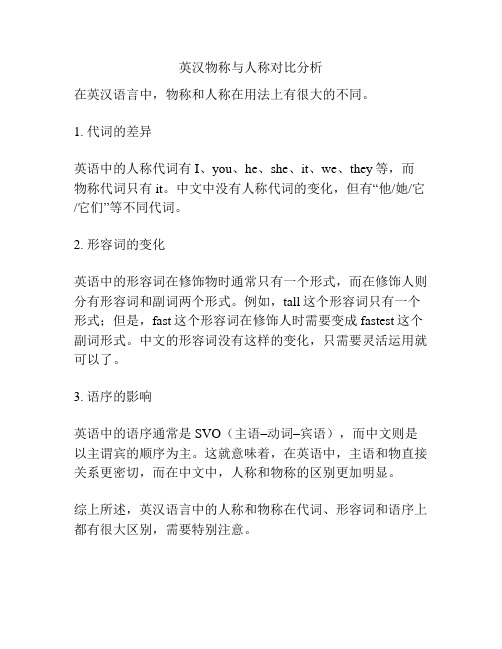
英汉物称与人称对比分析
在英汉语言中,物称和人称在用法上有很大的不同。
1. 代词的差异
英语中的人称代词有I、you、he、she、it、we、they等,而物称代词只有it。
中文中没有人称代词的变化,但有“他/她/它/它们”等不同代词。
2. 形容词的变化
英语中的形容词在修饰物时通常只有一个形式,而在修饰人则分有形容词和副词两个形式。
例如,tall这个形容词只有一个形式;但是,fast这个形容词在修饰人时需要变成fastest这个副词形式。
中文的形容词没有这样的变化,只需要灵活运用就可以了。
3. 语序的影响
英语中的语序通常是SVO(主语–动词–宾语),而中文则是以主谓宾的顺序为主。
这就意味着,在英语中,主语和物直接关系更密切,而在中文中,人称和物称的区别更加明显。
综上所述,英汉语言中的人称和物称在代词、形容词和语序上都有很大区别,需要特别注意。
英语语法精讲人称代词和物主代词区分

英语语法精讲人称代词和物主代词区分人称代词和物主代词是英语语法中常见的代词类型,它们在句子中承担着不同的语法角色。
在本文中,我将为你详细介绍人称代词和物主代词的区别以及它们在句子中的应用。
一、人称代词的基本概念人称代词主要用来代替特定的人或物,从而避免重复使用名词。
根据在句子中所处的不同角色,人称代词分为三种不同的人称:第一人称、第二人称和第三人称。
下面是它们的具体用法和示例:1. 第一人称代词(Singular: I,Plural: we)第一人称代词用来代表说话者自己或与说话者有关的人或物。
示例:- I am a student.- We like to travel.2. 第二人称代词(Singular: you,Plural: you)第二人称代词用来代表与说话者进行交流的人或物。
示例:- You are my best friend.- You should take care of yourself.3. 第三人称代词(Singular: he/she/it,Plural: they)第三人称代词用来代表除说话者和听话者之外的人或物。
示例:- He is a doctor.- They are studying at the university.二、物主代词的基本概念物主代词用来表示所属关系或拥有关系,常常与名词连用。
它们可以代替名词,表达出所属关系。
下面是物主代词的具体用法和示例:1. 第一人称单数物主代词(my)第一人称单数物主代词用来表示说话者的所属关系。
示例:- This is my book.- My parents are coming tomorrow.2. 第二人称物主代词(your)第二人称物主代词用来表示与说话者交流的对象的所属关系。
示例:- Is this your car?- Your dog is very cute.3. 第三人称物主代词(Singular: his/her/its,Plural: their)第三人称物主代词用来表示与说话者和听话者之外的人或物的所属关系。
英语人称代词和物主代词

英语人称代词和物主代词1、首先以下几个句子:我是个老师;你是个学生;她/他也是个学生;它是一支钢笔。
让我走,告诉你,和他/她/它玩。
2、看看这几个句子中你、我、她/他/它分别放在句子的什么位置,有什么不同的含义。
3、这就是我们今天要学的人称代词一、人称代词:用来代指人物称呼的代词叫人称代词人称单数复数主格宾格主格宾格第一人称I me we us 第二人称you you you you第三人称he himthey them she herit it人称代词主格:用在句首,作主语,表示谁是做什么的、怎么样了、干什么了、是个怎样的人等。
I am a teacher. You are student.He is a student, too. We/You/They are students.人称代词宾格作宾语,表示动作行为的对象,用在动词(用来形容或表示各类动作的词汇)、介词(是一种用来表示词与词、词与句之间的关系的虚词,在句中不能单独作句子成分)之后。
Give it to me. Tell me. Let’s go (let’s =let us)Say sth about him. Play with her.be动词:am、is、are -- was、wereI am--I wasshe/ he/ it is--she/he/it wasyou/ we/ they are--you/they/we wereDavid/Mary isDavid and Mary are1、翻译句子:我的书包,你的英语书,她的/他的桌子,它的头2、看看句首的代词发生了什么改变,是什么意思,有什么作用。
二、物主代词:表示所有关系的代词叫物主代词数人称类别单数复数第一人称第二人称第三人称第一人称第二人称第三人称形容词性物主代词my your his her its our your their 名词性物主代词mine yours his hers its ours yours theirs汉语我的你的他的她的它的我们的你们的他(她、它)们的形容词性物主代词:置于名词前,起修饰作用,表示某人的(my/your/his/her/its/our/their)+名词(不可单独使用)I love my mother.Her bag is black.名词性物主代词:起名词的作用(mine/yours/his/hers/its/ours/theirs)则相单于形容词性物主代词+名词,故其后不必加名词。
小学英语14-1人称-物主-指示代词

什么是代词代词是代替名词或名词短语的一种词类。
大多数代词具有名词和形容词的功能。
英语中的代词,可分为:人称代词、物主代词、指示代词、不定代词、疑问代词、关系代词、反身代词、连接代词和相互代词九种。
小学阶段主要接触的是前5种。
一、人称代词人称代词是表示“我”“你”“他”“她”“它”“我们”“你们”“他们”的词,是表示自身或人称的代词。
人称代词有单复数以及格的变化。
1.第一人称人称代词的主格作主语。
I am a girl,我是一个女孩。
We go to the park every Saturday.我们每周六去公园。
人称代词的宾格作宾语。
Give me a pencil, please.请给我一支铅笔。
Miss Fang teaches us English.方老师教我们英语。
2.第二人称和第三人称第二、第三人称在用法上与第一人称一样:You are a good teacher.(主语)你是一位好老师。
She is so happy to see us(主语)她很高兴见到我们。
Don’t tell him about it(宾语)不要告诉他这件事情。
It’s a nice present. I like it.(主语和宾语)这是一份很棒的礼物,我超级喜欢。
学习小贴士:●几个人称代词若作为主语连用,一般情况下第一人称I放在最后。
He and I are both students 他和我都是学生。
●it一般表示动物或者没有生命的物体。
但有几种情况下我们也常用it,比如说:①表示婴儿。
Look at the baby. It’s so cute.看那个婴儿,他真可爱。
②表示不清楚的状况。
Who is it?It’s me.谁在敲门,是我。
二、物主代词表示所有关系的代词叫做物主代词。
物主代词可分为形容词性物主代词和名词性物主代词两种。
列表如下:1.形容词性物主代词可用作定语,相当于形容词I love my country,我热爱我的国家。
汉英差异 物称与人称

• 1.2无灵主语与有灵主语 • 从有无生命角度划分,主语可区分为有灵 主语和无灵主语两类。有灵主语是有生命 特征的事物名称充当主语,例如:student, teacher, doctor等。无灵主语是无生命的事 物或表示概念的抽象名词所充当的名词,例 如:sight, success, darkness等。 • 有灵动词是指用来表示有生命特征的事物 的那种动作,例如:speak, say, cry, write等。无 灵动词则是指用来描写无生命特征事物的 动作、作用、变化等的那类动词,例如:rise, fall, move, cover等。
敲了敲门。
*A few moment brought them to a cottage door, at
which the owner knocked.
*④北京目睹过许多伟大的历史事件。 *Beijing has witnessed many great historical events.
*(3)具体事物作主语。 *⑤我们迎着朝阳来到甲板上。 * The morning sun greeted us as we came out on the deck. *⑥他收到一份紧急电报,匆匆去了洛杉矶。 * An urgent telegraph hurried him to Los Angeles. *(4)具有动词意味的名词作主语。 *⑦(人们)发现新物种后就可以研制新药。 * The discovery of new species will lead to new drugs. *⑧他想起这些,便会增加生活的热情。 *The remembrance of these will add zest to his life.
*2.2英语用“it”作主语,如it is believed,it is thought等,往往
初中英语人称代词与物主代词

初中英语⼈称代词与物主代词英语学科初⼀拼课讲义本节知识⼈称代词和物主代词⼀、知识梳理1.⼈称代词表⽰“我”、“你”、“他”、“她”、“它”、“我们”、“你们”、“他们”的词,叫做⼈称代词。
⼈称代词有⼈称、数和格的变化,见下表:(1)⼈称代词主格:作主语,表⽰谁怎么样了、⼲什么了。
如:I am a teacher.You are a student.He is a student, too.We / You / They are students.(2)⼈称代词宾格作宾语,表⽰动作⾏为的对象。
如:I like her.Give it to me.Let’s go (let’s =let us)⼈称代词顺⼝溜:⼈称代词有两类,⼀类主格⼀类宾;主格代词本领⼤,⼀切动作由它发;宾格代词不动脑,介动之后跟着跑。
练⼀练1)(I) are friends.4) John is going to see (they).2.物主代词表⽰所有关系的代词叫做物主代词,也可叫做代词所有格。
物主代词分形容词性物主代词和名词性物主代词⼆种,其⼈称和数的变化见下表:(1) 形容词性物主代词( my / your / his / her / its / our / their )+名词。
如:her book my teacher his bike(2) 名词性物主代词则相当于“形容词性物主代词+名词”, 故其后不必加名词。
如:—Is this your book?—No, it isn’t. It’s hers (her book)This pen is mine.物主代词顺⼝溜:物主代词不⽰弱,带着‘⽩勺’来捣乱;形容词性物主代,抓住名词不放松;最后只剩名词性,海阔天空任它⾛。
练⼀练1)He is (I) teacher.2) The bike is (she).3) What is (he) telephone number?4) It’s a cat. (it) name is Hope.课堂练习单选1. ________are in the same class.A. Her and meB. She and IC. Me and herD.I and she2. Please call ___ at 256-5896A. me3. —Do you like these computers?—No, I don't like_______.A. itB. themC. theyD. its4. Our teacher think(认为)_______are right.A. we/doc/e6157a4bf71fb7360b4c2e3f5727a5e9846a27c1.htmlC. itD. she5. ______go to the party.A. He, I and youB.I, you and heC. You, I and heD. You, he and I6. Is this______ dictionary?A. youB. yoursC. yourD. hers7.It’s a bird(鸟). ______name is Happy.A. It’sB. ItC. ItsD. His8. Is that ____ pencil case?A. heB. himC. hisD. he’s9. Please give the key to____.10. _____ will spend(度假) the summer vacation in Qingdao.A. He, you and IB. You, he and IC. I, you and he11. — Who is singing there?—_____ is Li Ming's sister.A. SheB. ThisC. ItD. That12. She is an old classmate of _____.A. meB. myC. mineD. us13. The radio is almost the same as(与……⼀样) _____.A. She'sB. herC. hersD. She14. _____ task is very easy.A. OursB. OurselvesC. Our/doc/e6157a4bf71fb7360b4c2e3f5727a5e9846a27c1.html15. I buy a nice skirt for _____.A. sheB. herC. herselfD. hers16. Mr. Zhang praised (表扬) _____ for his progress (进步) in studies.17. Everyone should do ______ best.A. itsB. onesC. hisD. their18. ______ is a close friend of _______.A. She, mineB. Her, mineC. She, myD. Hers, my19. Music makes ______ relaxing(放松).A. usB. oursC. weD. he20. —What's Tom's phone number?—_____ phone number is 81826753.A. He'sB. HisC. HeD. Her21. Where is your homework? I can't find _______ anywhere.A. youB. yourC. yoursD. yourself22. She is a student. _____ name is Julia.A. itsB. herC. hersD. hisD. my, I24. A friend of _____ came here yesterday.A. myB. hisC. himD. himself25. ___ pencil-box is beautiful. But ____ is more(更) beautiful than(⽐) ______.A. Toms, my, heB. Tom's, mine, hisC. Tom's, mine, himD. Tom's, my, his26. Most of ______like Chinese food.A. theyB. theirC. themD. theirs27. Let ____ help you?A. I and my friendB. my friend and IC. my friend and meD. my friend and I to28. How hard______ works!A. weB. himC. heD. his29. She gave the erasers to Lucy and _______ .A. IB. meC. myD. mineD. Her 适当形式填空1. Let _____ (I) help ____ (you).2. Let _____ (we) go.3. (I) _____ are students.4. I can't find _____ (they).5. Give ____ (he) the book.6. Miss Gao teaches ____ English at school. (we)7. I need a new schoolbag, so ___ mother buys one for ___. (I)8. This is not my dictionary. This is _____. (she)9. This book is not ____. (he)10. Look at ____ mouth. (I )11. They are ____ parents. (he)12. ____ classroom is bright(明亮).(I )13. He is ___ father. (Bob)14. Thank you for helping ___. (I )15. This isn’t ___pen. ___ is over there. (she)16.___ school is far away from (远离) ___ home. (he)17. ___ (we) can go to the zoo by bus.18. Mr. Ding teaches _______ (we) math.19. Bob loves _______ (he) mother very much.20. Do you know ________ (Lily) new teacher?21. ________ (we) new model plane can fly very high.22. I have a lovely(可爱的) cat. ____ (it) name is Carl.23. Jim is a very good boy. We all like ____ (he).24. The boy under the tree is Henry. This is ____ (he) bike.25. She doesn’t like ____ (she) new skirt.26. Who is the man over there? He is ___ (we) teacher.27. Is this red bag yours? No, _____ is yellow. ( I )28. These are ______ ( he ) brothers. That is _______( she ) sister.29. _______ (I) father is a teacher.30. Tom, this is _____ (me) cousin, Mary.33. My father and mother are teachers. _____ are busy (them)34. —Are these ________(you)pencils? —Yes, they are ________(our).35. ______(Ann)mother is ______(we) teacher.36. __________ is my aunt. We often visit(看望) __________. ( she )37. I love ________(they)very much.38. I have a blue bike. The red one isn’t __________. ( I )39. These new houses are so nice. _______ are very expensive(昂贵的).( them )40. Mike is my classmate. ____ is good at English. ( his )41. Kate wants a glass of milk. Will you pass(递) it to ____ ? ( she )42. What’s the weather like today? ____ ( it ) is cloudy.43. Mr. and Mrs. Green and a friend of ____ are coming to see us. ( they )44. —Are these ________(they)bags ?—No, they aren’t ________(their). They are ________(we).45. This isn’t________ knife. _________ is green. ( she )46. These are your books,Kate. Put __________ in the desk,please. (they)47. _______ must look after(照看) ________ things. ( you )48. Wei Fang,is that ________ ruler? Yes,it’s.( you )49. They want a football. Give __________ the green one,please. ( they)50. It’s Lin Tao’s bag. Give it to __________. ( he )51. Is this pencil-box Li Lei’s? No,___________ is very new. ( he )改错,判断下列句⼦中的代词是否有错误,如果有请改正。
- 1、下载文档前请自行甄别文档内容的完整性,平台不提供额外的编辑、内容补充、找答案等附加服务。
- 2、"仅部分预览"的文档,不可在线预览部分如存在完整性等问题,可反馈申请退款(可完整预览的文档不适用该条件!)。
- 3、如文档侵犯您的权益,请联系客服反馈,我们会尽快为您处理(人工客服工作时间:9:00-18:30)。
一则图书馆通知
It has been noted with concern that the stock of books in the library has been declining alarmingly. Students are asked to remind themselves of the rules for the borrowing
鸭卵,用作制备组织培养 3.一天的行程 行DNA扩增的一种实验技 或病毒疫苗) 4.历程;过程;进程 译作:鸡胚实验 术
车 5.(尤指在煤矿上使用的)矿车列
我兴奋地说不出话。
4、My good fortune has sent you to me.我很幸运,能够得到你。 5、I am very sorry that the pressure of other occupations has prevented me from sending an earlier reply to your letter. 近来忙于其他事务,未能早些复信,深感抱歉。
假设每人都要和平
to assume a principle in reasoning
在推理中假定一个原理是正确的
Everyone assumed him to be dead.
大家都以为他不在人世了。
consider:以为,认为,视为,把…看做
She considered herself superior to others.
but plant viruses are known to be abundant in human faeces.
译言网
过去一向以为植物病毒不能感染动物,反之 亦然,但是植物病毒却被发现在人类粪便中大量 存在。
assume:假定,假设;臆断,想当然地认为
to assume that everyone wants peace
这种表达法使叙述显得客观、冷静、结构趋于严密、
紧凑。
英语中用非人称作主语的句子大致分为2类:
汉语也有类似情况但常见于形象的 1. 用抽象名词或无生命的事物名称作主语,同时又使用 比喻或轻松的文体。如:
本来表示人的动作或行为的动词作为谓语,因此往往带有
什么风把你吹来了? 拟 人的修辞色彩,语气含蓄,令人回味,带有英语ቤተ መጻሕፍቲ ባይዱ族
译文:
从早期的含卵胚实验到连接酶链式反应,这段过
程包括了诸如组织培养,酶免疫测定,荧光分析技术 和分子技术等大量的研究工作。
ligase chain reaction embryonated egg journey
1.(通常指长期的陆上)旅行,旅
鸡胚,含卵胚(指含有活 游
连接酶链式反应
胚胎的卵,通常是鸡卵或 为利用耐热DNA连接酶进 2.旅程;行程;路程;行程
物称与人称
Impersonal vs. Personal
英语常用非人称表达法。也就是:不用人称主语来
叙述,而是表达客观事物如何作用于人的感知,让事物
以客观的口气呈现出来,注重“什么事发生在什么人身 上”。这种非人称表达法是英语常见的一种文风,尤其 常见于书面语,如公文、新闻、科技论著以及散文、小 说等文学作品。
发来叙述客观事物,或倾向于描述人及行为或状态,因而 常用人称。
1、What is wrong with you ?
你怎么了?
2、Not a sound reached our ears. 我们没有听到任何声音。 3、Excitement deprived me of all power of utterance.
viruses can not infect animals, and vice versa. 1.新汉英大词典:plant virus
2.百科:植物病毒(viruses of plants)是指感染高等植物、藻类等真 核生物的病毒。早在1576年就有关于植物病毒病的记载,举世闻名的、 例句: 美丽的荷兰杂色郁金香,实际上就是现在所谓郁金香碎色花病毒造成的。 经常见到的症状有:①斑点。坏死斑或退绿斑。②花叶。叶片上出现斑 Plant virus disease brings great economical damage. 纹,有的完全黄化或红化。③器官畸形。如引起水稻黑条矮缩、小麦丛 矮、玉米矮花叶等病的病毒。
and return of books, and to bear in mind the needs of other
students. Penalties for overdue books will in the future be strictly enforced.
•
近来已注意到本馆存书惊人地减少,此事令人 关切。现要求学生不要忘记借书还书规则,并考 虑其他学生需要。今后凡借书逾期不还者,必将 严格按章处罚。
from now on, we are going to enforce the rules strictly. You have been warned !
人们一直认为植物病毒不会感染动物,反之亦然。
翻译:It has always been considered plant 译文:It has always been assumed that that plant
的幽默感。 爱情把我们的心连在一起。
高山低头,河水让路。 2. 用“it” 代替人以外的事物或者生物,做形式主语, 形式宾语。 树欲静而风不止。
相对而言,汉语一般则更习惯于人称化的表达,尤其 是主语,能施行动作或有生命的物体为主语之首选,注重 “什么人怎么样了”。究其因,乃是汉语较注重主体思维,
这种思维模式以“万物皆备于我”作主导,往往从自我出
译文:
据报道,美国的胃癌死亡率呈现显著的连续性下 降,从1930年的0.034‰降为目前的0.008‰,但下降 原因不明。
striking
显而易见的 明显的
death rate
死亡率
unexplained gastric carcinoma 胃癌
不明原因的 未经解释的
The journey from embryonated egg to the ligase chain reaction has embraced an enormous amount of work involving tissue culture,enzyme immunoassay,fluorescence, and molecular techniques.
译者注:植物病毒
植物病毒病害造成重大的经济损失。
《People pick up pepper virus》
原文来自: always been assumed that plant It has /article/dn18771-people-pick-up-pepperviruses cannot infect animals, and vice versa, virus.html#.Up6j0LKcEns
•
The number of books in the library has been going down. Please make sure you know rules for borrowing , and don’t
forget that the library is for everyone’s convenience. So
她认为自己比别人高一等。
There has been a striking continuous, but unexplained decline in the reported death rate of gastric carcinoma in the United States from 34 per 1,000,000 population in 1930 to 8 per 1,000,000 currently.
